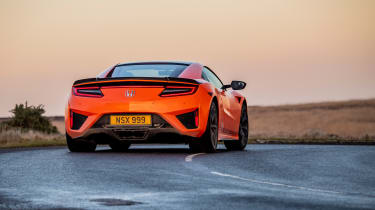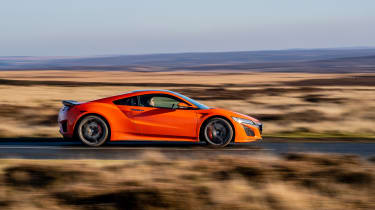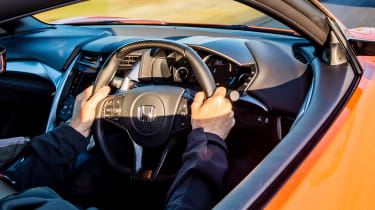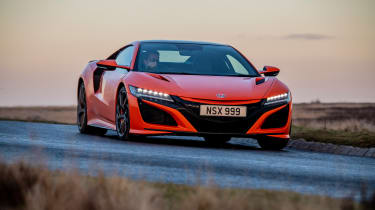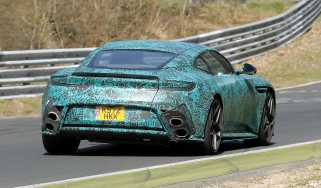Honda NSX 2020 review - enough to take on its European rivals?
Honda’s supercar is immensely capable and startlingly fast, but it’s easier to respect than it is to love
Honda’s latest NSX might take time to reach the levels of appreciation directed at its naturally aspirated predecessor, but it’s undoubtedly an incredibly capable performance car that transcends its humble badging and offers a genuinely different experience from the norm.
The NSX got a gentle update in 2019, with purported improvements in comfort and handling, and behind-the-scenes electronics tweaks. These changes might be subtle, but they’re a fine opportunity to once again get under the skin of Honda’s intriguing supercar.
> Ferrari F8 Tributo review – still want that McLaren 720S?
Engine, performance and 0-60 time
The NSX’s hybrid drivetrain is among the more complex collections of components in modern vehicles, but reducing it to its bare essentials you’ve got a twin-turbocharged 3.5-litre V6 between the cabin and rear wheels, and a pair of electric motors up front. That makes it both mid-engined and all-wheel drive.
In slightly more complex terms, the V6 and its attendant nine-speed dual-clutch transmission sandwich an electric motor, not unlike Honda’s earlier Integrated Motor Assist hybrids, but unlike those earlier hybrids the motor can be operated independently of the engine. Additionally, the two front motors sit within a single front drive assembly, but can operate independently for torque vectoring.
The rear motor makes 47bhp, and combined with the efforts of the V6, that end of the car is good for around 500bhp – the exact figure being hard to pin down given the engine and motor develop their power and torque peaks at different points. Each front motor, meanwhile, is good for 36bhp and 54lb ft. In all, Honda claims 573bhp, with 476lb ft of torque at a combined 2000rpm.
More reviews
It’s quick, too, with 62mph coming up in 2.9sec, and acceleration finally petering-out at 191mph. The NSX can run on electric power alone, with reasonable acceleration from the front and rear motors, but with a relatively small battery pack, pure EV running is fairly limited.
Technical highlights
What? The hybrid drivetrain wasn’t good enough for you? Well, like its much-loved predecessor, the NSX’s structure is aluminium, though its space-frame construction does feature steel A-pillars for additional strength. The roof panel and floor are carbonfibre, and body panels are a mix of aluminium and plastic. While the construction is advanced, the car’s largely hand-built.
Do all those fancy materials make it light? Not really – you can thank the hybrid set-up and battery pack for that. At 1776kg it’s lighter than many pure electric cars with comparable performance, but against more obvious rivals such as the Ferrari 488, it’s carrying almost 400kg extra.
Tweaks in 2019 changed a few things about the NSX’s basic package. The adaptive dampers have now been calibrated for extra comfort in their softest setting, but still ramp up for more control in the Sport+ and Track modes.
Anti-roll bars are now thicker too, and the tyres are stickier Continental SportContact 6 rubber. Honda also upgraded the hubs, and recalibrated the steering, hybrid system and stability controls. Visually, the changes are even more subtle; the front grille garnish is now body-coloured rather than chrome and the grille itself is gloss black. The orange paintwork you see here is new, too.
What’s it like to drive?
Without driving the latest car back-to-back with its pre-refresh counterpart, it’s difficult to say how effective the changes have been. The NSX drives much as it did before, which is both a blessing and a curse – it’s as fast and capable as ever, but also slightly aloof compared to the very best supercars it competes with.
In absolute terms, the NSX is indeed a comfortable car in its latest iteration, even if we can’t promise it’s smoother than its immediate predecessor. That’s as much down to the cosseting cabin as it is the car’s ride quality, both of which would make the NSX a fine grand tourer if luggage space and fuel tank range were both a little more generous. BMW’s i8 suffers a similar affliction.
It’s startlingly quick too. Full throttle is like being launched from a trebuchet. One second you’re stationary, the next you’re at the legal limit. The electric motors basically eliminate any slack over the few tenths it takes for the V6 to fill its lungs, though at part-throttle it sometimes feels like two stages of acceleration – first a burst of electrical energy, then a whack from the engine once the dual-clutch has picked a suitable ratio.
With most of the power directed to the rear wheels, it doesn’t actually feel as tied-down as some all-wheel-drive performance cars, and the rears will happily trouble the traction control on greasier surfaces, but so quickly does it thunder through each gear you barely have time to click the gearshift paddles. The soundtrack is more industrial than inspiring, but it’s prominent enough to add to the excitement.
The NSX has a Nissan GT-R quality in the corners, somehow overcoming its mass to deliver huge grip and impressive neutrality, but the NSX is actually closer to that video game-style feeling people expect of the Nissan. There’s probably adjustability to be unlocked at circuit speeds, but on the road the Honda is more point-and-shoot. With light steering and good balance it feels agile, but its abilities are more awe-inspiring than they are engrossing.
While there’s no real hook, there’s still something very appealing about the way the NSX drives. Indomitability is part of it, but also the unique feel of the drivetrain and the small but increasingly important pleasure of being able to ‘switch off’ when you leave the country roads and head back into town.
Price and rivals
It might have a Honda badge, but at £144,765 it’s got a supercar price tag. You’d expect no less given its hand-built nature, the density of technology packed within and the levels of performance on offer, but just as the first Honda NSX was uncharted territory for Honda, the latest car has its work cut out to compete with McLarens when selling from the same showrooms as the Civic and Jazz. Talking of which, just two UK dealers are geared up to sell the supercar: Chiswick Honda, and Crown Honda, both in London.
The McLaren comparison is apt, as a 570GT comes in around the £150,000 mark – as do used 720Ss these days, so unless your heart is set on a Honda or on the hybrid drivetrain, it’s a tough sell indeed. The NSX’s price bracket also includes rivals as diverse as the Audi R8, Aston Martin Vantage and Mercedes-AMG GT in its various forms. Most are more emotive driving experiences, though Honda does still hold all the hybrid cards at this point in the market.


